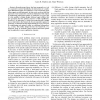Free Online Productivity Tools
i2Speak
i2Symbol
i2OCR
iTex2Img
iWeb2Print
iWeb2Shot
i2Type
iPdf2Split
iPdf2Merge
i2Bopomofo
i2Arabic
i2Style
i2Image
i2PDF
iLatex2Rtf
Sci2ools
CDC
2009
IEEE
2009
IEEE
Overcoming limitations of game-theoretic distributed control
—Recently, game theory has been proposed as a tool for cooperative control. Specifically, the interactions of a multiagent distributed system are modeled as a non-cooperative game where agents are self-interested. In this work, we prove that this approach of non-cooperative control has limitations with respect to engineering multi-agent systems. In particular, we prove that it is not possible to design budget balanced agent utilities that also guarantee that the optimal control is a Nash equilibrium. However, it is important to realize that game-theoretic designs are not restricted to the framework of non-cooperative games. In particular, we demonstrate that these limitations can be overcome by conditioning each player’s utility on additional information, i.e., a state. This utility design fits into the framework of a particular form of stochastic games termed state-based games and is applicable in many application domains.
Budget Balanced Agent | CDC 2009 | Control Systems | Engineering Multi-agent Systems | Non-cooperative Games |
Related Content
| Added | 21 Jul 2010 |
| Updated | 21 Jul 2010 |
| Type | Conference |
| Year | 2009 |
| Where | CDC |
| Authors | Jason R. Marden, Adam Wierman |
Comments (0)

